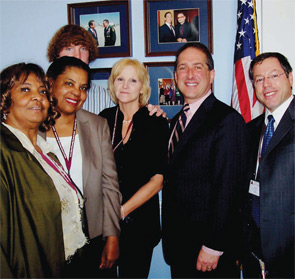
One way to succeed in our mission of advancing rheumatology is to increase the ACR’s presence on Capitol Hill through grassroots and direct lobbying. However, for the rheumatology subspecialty to be most effective we must use all tools available to us, including RheumPAC, the ACR’s nonpartisan political action committee. RheumPAC demonstrates to members of Congress that the rheumatology subspecialty is committed to political action, educating policy makers, and improving healthcare for our patients.
RheumPAC provides opportunities for the ACR to educate Congress on the importance—and especially the value—of rheumatology. Recently, ACR President David Borenstein, MD, attended a small dinner event for Sen. Orrin Hatch (R-UT). As the ranking member on the Senate Finance Committee and a member of the Health, Education, Labor, and Pensions Committee, Senator Hatch will play a key role in developing health policy in the 112th Congress. During the event, Dr. Borenstein had the opportunity to personally discuss many issues affecting the rheumatology community including the elimination of consultation codes, a permanent fix to the Sustainable Growth Rate, and the importance of arthritis research.
Attending these small events allows ACR representatives to personalize our message and begin building relationships with key legislators in addition to furthering knowledge of rheumatology among policymakers. RheumPAC members along with other members of the ACR plan to meet with members of Congress throughout the year to continue the dialogue on the role rheumatology plays in care coordination, improved patient outcomes, and the importance of cognitive specialties.
With the changes in Congress, having a strong RheumPAC is more important than ever. RheumPAC will continue outreach to returning members of Congress and the newly elected U.S. senators and representatives. If we want to fulfill our mission and advance rheumatology, we must have a strong presence in Washington, D.C. Find out how you can get involved or to learn more about RheumPAC, visit www.rheumatology.org/advocacy.
Why I’m an Advocate
“I have supported RheumPAC for the past several years because I recognize the need for the ACR to have a presence on Capitol Hill. Financially supporting influential people in Congress assists the ACR in its advocacy efforts by providing more opportunities to meet with members of Congress and educate them on rheumatology-related issues. All rheumatology professionals benefit when the ACR is involved. RheumPAC makes these opportunities possible. This is one way we can strengthen our position and visibility, and improve our chance of having influence over the critical decisions made by Congress that affect all rheumatologists.”
—Robert W. Levin, MD, RheumPAC member since 2008
Find out how you can get involved or to learn more about RheumPAC, visit www.rheumatology.org/advocacy.